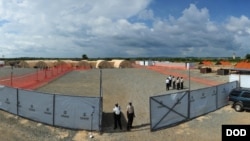The U.S. and Liberian governments have opened a 25-bed Ebola treatment unit outside Monrovia to treat health workers infected with the virus. Providing high-quality care is considered key to recruiting local Liberian staff and persuading much-needed Western health workers to come battle the Ebola epidemic.
It took the U.S. military five weeks to transform a swampy field outside Monrovia into an Ebola field hospital, built and stocked according to Médecins Sans Frontières and World Health Organization guidelines.
The air-conditioned medical unit has 25 beds and is staffed by 70 officers from the U.S. Public Health Service. It is the first Ebola treatment unit, or ETU, built specifically for health workers.
“This facility is a beacon, a beacon that signals to all health care workers and responders from Liberia and all other nations to come to Liberia and join in the response,” said U.S. acting Deputy Surgeon General, Rear Admiral Scott F. Giberson. “We are here to help, to bring safety and security to the courageous young men and women who are serving in our front lines.”
Health workers run a high risk of contracting Ebola because they can come in contact with the blood and other bodily fluids of Ebola patients.
The disease, which causes fever, bleeding, vomiting and diarrhea, has decimated the ranks of West African medical workers, killing more than 300, more than half of them in Liberia. Many died in the early days of the epidemic when they did not have necessary gear or training to protect themselves.
Quick care is critical
Rapid access to supportive care can improve an Ebola patient’s chance of survival. This new medical unit will be able to provide intravenous rehydration therapy, medication to alleviate symptoms and close monitoring of electrolytes and vital signs.
This advanced level of care has not been available at local Ebola treatment units.
Liberian President Ellen Johnson Sirleaf toured the new Monrovia Medical Unit this week. She said health workers had made the “ultimate sacrifice” and deserved the best possible care.
Meanwhile, the World Health Organization said Friday that the death toll from the Ebola crisis had risen to 4,960, with more than 13,200 others infected with the disease. The rate of increase in the number of cases, however, has declined, it said.
The U.N. agency said the number of Ebola cases varied by district across the three West Africa countries most affected by the disease — Guinea, Liberia and Sierra Leone. It said the number of cases was falling in some districts while rising steeply in others.
The WHO said that widespread, rigorous control measures were needed to stop the virus and that it was critical for unaffected neighboring countries to be prepared.
Caution from ambassador
The U.S. ambassador to Liberia, Deborah Malac, said that while the rate of increase for Ebola was declining, the international community cannot get overconfident.
"We are not yet on the true downward curve or close to zero," Malac said. "The nature of the epidemic is changing, and so we need to continue to be vigilant, and we need to train people who can address this — either for this outbreak for however long it takes, or for future outbreaks — to understand and pounce on it as soon as it pops out in the future."
Also Friday, the U.S. city of Dallas, Texas, marked the end of its Ebola crisis as the last people being monitored for symptoms were cleared of the virus.
President Barack Obama called state and local officials and thanked them for their leadership. More than 170 people were monitored after coming into contact with a Liberian man who died in a Dallas hospital, or with the two nurses who contracted the virus while caring for him.




